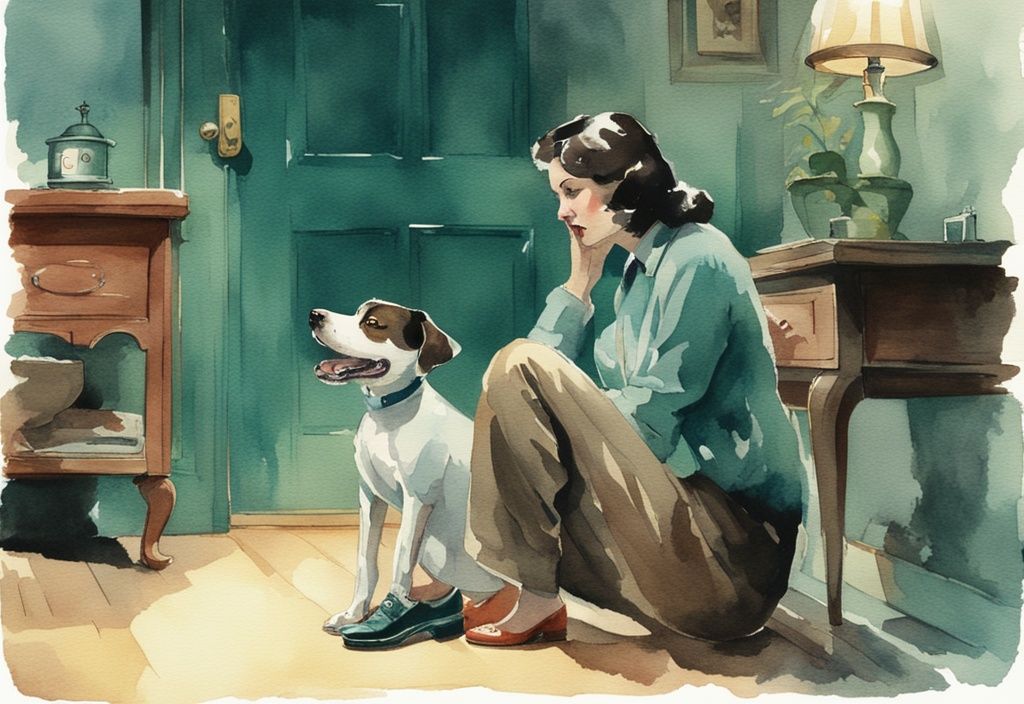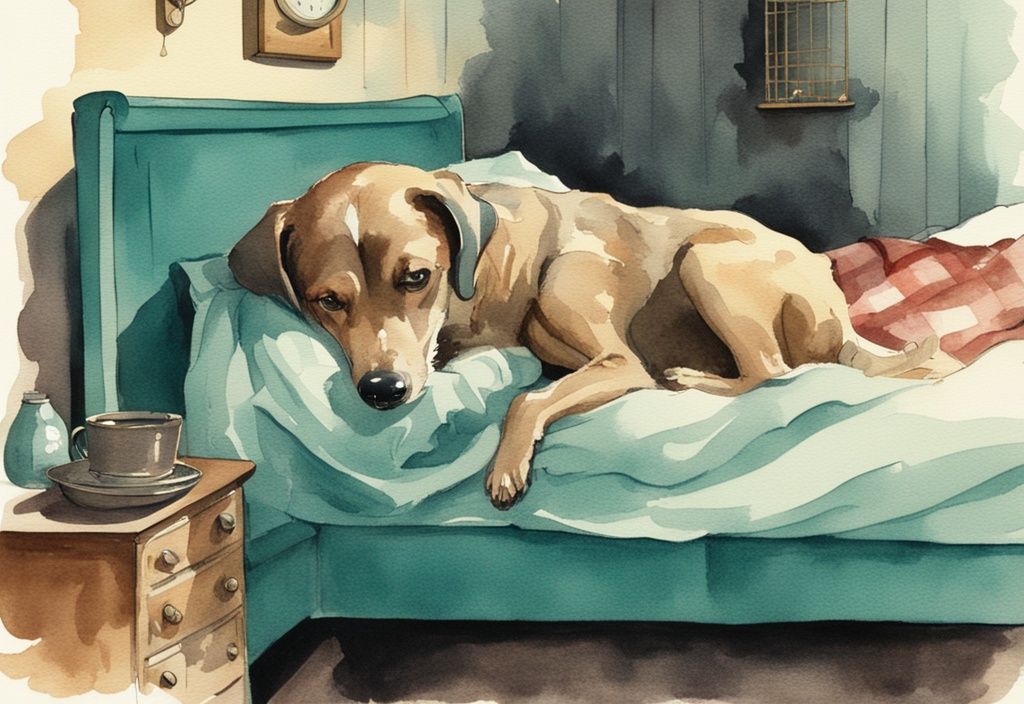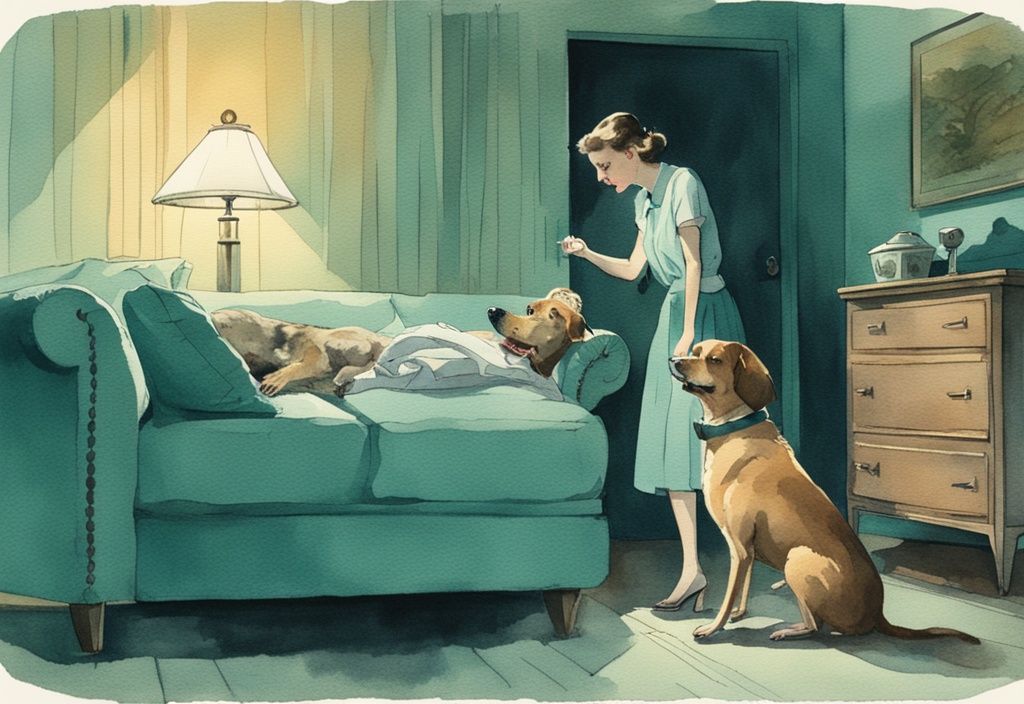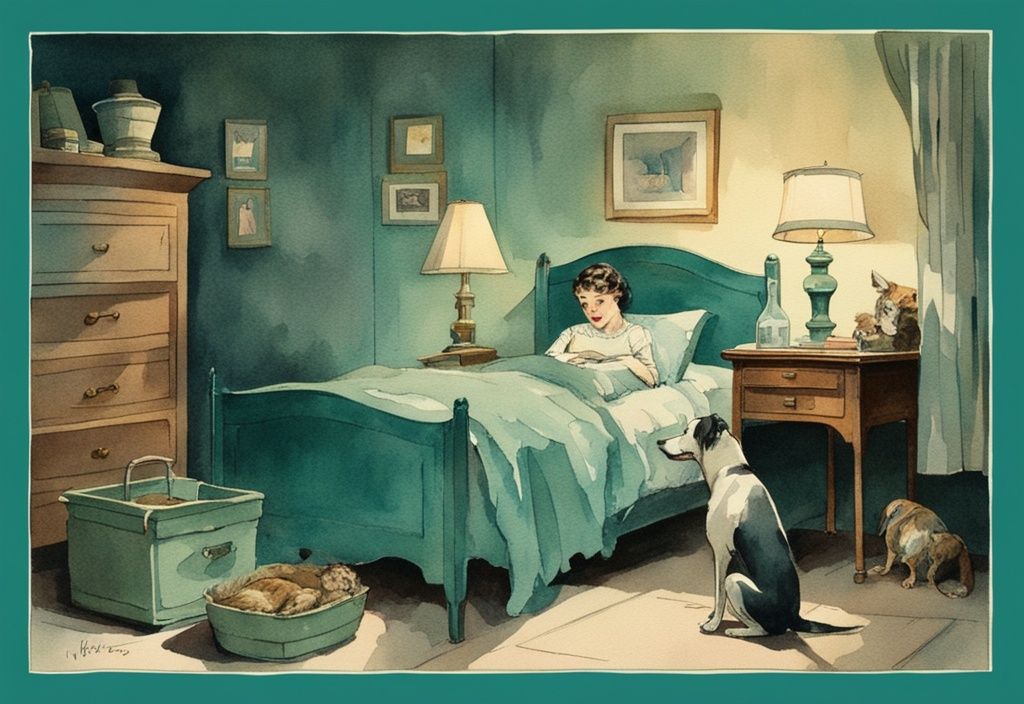Are you noticing your loved one, your dog, is panting more than usual during the night and wondering, “Why is my dog panting at night?” Suddenly woken from a sound sleep by the rapid, shallow breaths of your fur baby can be unsettling, I know. You’re not alone, and it’s admirable you’re seeking out answers to ensure your pup is comfortable and healthy.
In this article, we’ll uncover the myriad of possible causes and the initial steps you need to take. From recognizing the spent signs of heatstroke to expertly managing stress – it’s all covered here to arm you with handy knowledge and feasible solutions.
Stay tuned, because understanding your dog’s nighttime panting could significantly change their quality of night rest, and consequently, their overall health.
Understanding Normal vs. Excessive Nighttime Panting In Dogs
Curious about “why is my dog panting at night”? Let’s dive in and break it down.
Normal Panting: Following Their Body’s Clues
For anyone pondering “why is my dog panting at night,” it’s crucial to grasp that panting is a natural mechanism dogs use to regulate their body temperature. Unlike us, dogs can’t sweat to cool down, so they rely on panting to release heat. Imagine them exhaling their excess warmth into the night air. It’s entirely normal for dogs to pant after an exciting play session or a romp in the park. Their bodies are just trying to chill and get back to a calm state.
If you’ve noticed your dog panting at night, think about their activity level during the day. Have they been extra active or playful? This cooling process after exertion is completely natural. When your pup is at rest and in a serene state, they’ll typically breathe at a rate of 15 to 35 breaths per minute. An occasional panting session at night is nothing to worry about, especially if it matches their daily hustle and bustle.
When Panting Becomes a Cause for Concern
It’s essential to distinguish between normal panting and signs of distress if you’re asking, “why is my dog panting at night?” When panting becomes excessive and your furry friend should be resting, it might signal a problem. A breathing rate exceeding 40 breaths per minute at rest raises a red flag and needs your attention.
Take note if the panting is persistent or unusually intense without any clear cause. This could indicate an underlying health issue or anxiety. Also, watch for additional warning signs like reluctance to drink water, eat, or move. Other concerning symptoms include pale or blue gums and excessive drooling. These indicators suggest problematic panting and mean it’s time for a vet visit. Professional evaluation is crucial to address any potential health concerns.
Causes Behind Your Dog’s Nighttime Panting
The Hidden Signs of Heatstroke
Panting is a natural mechanism for dogs to cool down, but excessively heavy panting at night, particularly when temperatures soar above 106°F (41°C), can be alarming. Heatstroke in dogs manifests through vigorous panting, dehydration, and discolored gums, signaling an urgent need for medical attention. It’s critical to recognize these signs early and take swift action, as heatstroke can escalate quickly, leading to severe complications or even collapse. Ensuring your dog has access to a cool environment and plenty of water can help prevent this dangerous condition.
Recognize Symptoms of Cushing’s Disease
Why is my dog panting at night? One possible answer could be Cushing’s Disease, especially if your furry friend is in their senior years.
This hormonal disorder is notorious for causing increased thirst, hunger, and urination, coupled with hair loss and a distinctive pot-bellied appearance. Additionally, some dogs might suffer from unique conditions like short spine syndrome, which requires special care and understanding. Nighttime panting often accompanies these symptoms as the disorder disrupts their normal physiological processes. Monitoring your dog for these signs and seeking veterinary advice can lead to an appropriate diagnosis and management plan, helping to mitigate the discomfort caused by this ailment.
Panting as a Signal of Heart Disease
If you notice your dog panting and coughing after minimal exertion at night, it might be indicative of heart disease. Dogs with heart issues often experience difficulties in breathing due to fluid accumulation in their lungs or reduced heart efficiency. This condition necessitates a professional diagnosis and treatment regimen from a veterinarian. Ensuring your dog receives the proper care can improve their breathing and overall quality of life, addressing the root cause of nighttime panting.
Is Stress or Anxiety Disturbing Your Pet’s Sleep?
Restlessness and why is my dog panting at night could be linked to stress or anxiety. Common triggers include loud noises such as thunderstorms or fireworks, as well as separation anxiety. These stressors can lead to behavioral changes, manifesting in panting and disrupted sleep patterns. Identifying the specific cause of your dog’s anxiety is crucial. Using calming techniques such as creating a safe space, playing soft music, or employing anxiety wraps can significantly alleviate their discomfort, fostering a more serene sleeping environment.

Environmental Factors Influencing Night Panting
High nighttime temperatures can contribute to why is my dog panting at night. Dogs, particularly puppies and seniors, are sensitive to changes in their environment, which can affect their comfort levels and sleep quality. Additionally, untreated allergies may exacerbate nighttime panting by causing discomfort or respiratory issues. Making adjustments to their sleeping area, such as cooling the room, using hypoallergenic bedding, and addressing potential allergens, can help manage this issue effectively. Ensuring your dog’s sleeping environment is optimal is key to reducing nighttime panting and promoting restful sleep.
Is Your Dog’s Night Panting a Call for Immediate Veterinary Attention?
Sometimes, our beloved furry friends exhibit behaviors that worry us, and night panting can be one of them. Several serious conditions might be causing this, and it’s essential to understand them to ensure your dog stays happy and healthy.
Identifying Heatstroke: When It’s Too Hot to Handle
If you’re left wondering, “Why is my dog panting at night?” especially during hot spells, heatstroke could be the culprit. In those sweltering months, our dogs are just as susceptible to the heat as we are. Watch out for signs such as heavy panting, dehydration, and gums that look unusually light or even grey.
Heatstroke is a severe condition. If your dog collapses, it’s a clear red flag. Quick action to cool your dog and bring them to the vet can be the difference between recovery and severe complications. Let’s always remember, prevention is better than cure—keep your dog cool and hydrated, especially when it’s scorching outside.
Respiratory Distress: More Than Just Panting
Sometimes, the question of “Why is my dog panting at night?” points towards something more than heat—the distressing realm of respiratory issues. Heavy panting paired with difficulty breathing might spell trouble. Take a close look at their tongue and gums; a frightening shade of blue, purple, or grey is a definite emergency.
Such symptoms could signal anything from an obstruction in the airway to other critical respiratory issues. In these moments, immediate veterinary help isn’t just recommended, it’s a necessity. Our dogs trust us to take quick action to ensure their wellbeing.
Severe Dehydration: When Panting Is Not Enough
If you’re left contemplating, “Why is my dog panting at night?” severe dehydration might be another pressing concern. Tell-tale signs include a dry mouth, sunken eyes, and a lethargic demeanor. Panting can be their urgent attempt to regulate hydration.
In these situations, time is of the essence. Quick administration of fluid therapy by a vet is crucial. It’s incredible how fast our furry pals can bounce back with the right help.
Always keep an eye on the subtle signs your dog gives you. Our four-legged companions depend on us to notice these cues. With a bit of vigilance and a lot of love, we can ensure they stay safe and sound.
Simple Ways to Manage Your Dog’s Nighttime Panting
Creating a comfortable and tranquil sleeping environment, using calming products, and incorporating effective behavioral training techniques are essential strategies for managing your dog’s nighttime panting. These tips can help your furry friend rest easier and ensure both of you enjoy peaceful nights.
Crafting a Comfortable Sleeping Environment
Creating the perfect sleeping environment can significantly reduce your dog’s nighttime panting. Ensure the sleeping area is cool and well-ventilated. Dogs, much like us, can struggle to rest if they’re too hot, so keeping the space cool is crucial. Using a small fan for proper airflow can make a world of difference in their comfort.
A cozy bed also plays a vital role in your dog’s relaxation, promoting better sleep. Think of it like your favorite blanket – something that just makes everything feel right. Lastly, maintaining a consistent and calm bedtime routine helps signal to your pup that it’s time to wind down. Consistency is key in reducing any anxiety that might lead to panting.
Calming Products for a Peaceful Pet’s Night
If your dog’s nighttime panting stems from anxiety or stress, calming products might be just what they need. Anxiety wraps can offer a gentle, soothing pressure that helps calm them down. Pheromone diffusers are another great tool, mimicking natural calming signals to help your dog feel more at ease.

And don’t forget about the power of sound. Playing soft music or white noise can mask disturbing sounds like thunderstorms or fireworks, which often trigger anxiety-induced panting. For a holistic approach, consider natural supplements like CBD oil. But always check with your vet first to ensure they’re safe and suitable for your pup.
Behavioral Training Techniques for a Better Sleep
Incorporating behavioral training can also help manage your dog’s nighttime panting. Start with a bedtime routine that gently signals to your dog when it’s time to calm down and prepare for sleep. Consistent cues and practices can help your dog associate specific activities with bedtime, making the transition smoother.
Engage in interactive play during the day to tire them out, reducing nighttime restlessness. This also strengthens your bond while ensuring your pet is physically exhausted enough to sleep soundly. Managing anxiety and stress through training and positive reinforcement will contribute significantly to a more restful night for both you and your dog.
By combining these strategies, you can create an ideal sleeping environment, utilize calming products, and introduce effective behavioral training to help manage why your dog is panting at night. This holistic approach not only alleviates your dog’s discomfort but also fortifies the precious bond you share.
Dealing with Persisting Night Panting: Treatment Options
If you’re asking yourself, “why is my dog panting at night,” it’s important to consider various treatment options. Ensuring your furry friend feels comfortable and addressing potential underlying health issues are key steps.
Soothing Their Pains: Relief Options
Panting at night could be a red flag for chronic pain in dogs. For conditions like arthritis, a vet may prescribe specific pain medications that help in reducing discomfort effectively.
Regular veterinary check-ups are crucial. These help manage and adjust treatment plans for chronic conditions, ensuring that the pain management strategies remain effective.
Additionally, non-medicinal aids such as orthopedic beds can play a significant role in alleviating discomfort. These specially designed beds provide better support to joints, contributing to a restful night for your pet.
Medication and Fluids: When Home Remedies Aren’t Enough
If you’re wondering “why is my dog panting at night” despite providing a comfortable environment, there may be underlying health conditions that require medical intervention.
Veterinarians can prescribe medications tailored to treat specific issues such as heart disease and hormonal imbalances, which are often contributors to excessive panting.
In cases of dehydration, fluid therapy may be necessary to restore the balance of body fluids. Regular monitoring and appropriate adjustments to treatment plans are vital to ensure the effectiveness of these medical interventions, enabling your dog to have a more peaceful night.
Oxygen Therapy and Hospitalization: Advanced Treatment Options
For severe conditions such as respiratory distress or heart failure, oxygen therapy might be required. This advanced treatment provides immediate relief by ensuring that your dog receives adequate oxygen, alleviating breathing difficulties, and reducing panting.
In critical cases, hospitalization allows for intensive care and continuous monitoring. This is essential for stabilizing your pet and preventing further complications. If you’re wondering, why your senior dog isn’t eating, this level of advanced care ensures that your dog receives all necessary treatments in a timely manner, enhancing their recovery and comfort.
FAQ: Your Questions About Night Panting Answered
Dog panting at night can be confusing and worrisome. This section delves into common concerns and provides practical guidance to help you understand why your beloved pup is panting at night and what steps you can take.

What should I do if my dog is panting heavily at night?
If your dog is panting heavily at night, it’s crucial to create a comfortable environment. Make sure the room is cool and well-ventilated—sometimes, a simple fan can work wonders. Stress can also play a role, so try to keep things calm and soothing.
Look out for signs of heatstroke, dehydration, or general distress. Symptoms might include excessive drooling, pale gums, or a noticeable reluctance to eat or drink. If these signs are present, some cold water and a quick cool-down session might help, but consulting a vet is always the best route for persistent issues.
How can I tell if my dog’s panting is a sign of a serious problem?
One way to assess the situation is by counting their breaths—more than 35 breaths per minute might be cause for concern. Combine that with other red flags like a lack of appetite, discolored gums, lethargy, or constant drooling, and it’s definitely time to act.
Your furry friend’s health is paramount, and sometimes panting at night is their way of signaling something more serious. A prompt visit to the vet can give you peace of mind and ensure your dog gets the care they need.
When should I take my dog to the vet for panting?
If your dog shows any signs of heatstroke or respiratory distress, such as heavy panting or dehydration, it’s vital to get them to the vet immediately. Discolored gums are another significant indicator that something could be wrong.
Excessive, continuous panting, especially when combined with other worrying symptoms, merits urgent medical attention. Regular check-ups are also important, particularly if panting is linked to pre-existing health conditions. Keeping a close eye on their health ensures your pup stays happy and hearty.
Wrapping Up: Ensuring Your Dog’s Comfort during Nighttime
Ensuring your dog’s comfort at night is essential to address the concern, “why is my dog panting at night.” A well-thought-out strategy to create a soothing environment can significantly improve your dog’s nighttime experience.
Creating a Comfortable and Cool Sleeping Environment
A comfortable sleeping area is vital for your dog’s overall well-being, especially if you’re wondering, “why is my dog panting at night.”
Opt for a cool and well-ventilated space. Providing a fan or air-conditioner can help regulate room temperature, keeping your pet cool. A cozy bed tailored to your dog’s size and needs can add to their comfort, ensuring restful sleep. If you’re wondering how much chicken and rice for dog by weight, it’s important to consider individual dietary needs.
Using Calming Aids and Regular Health Check-Ups
To manage night panting effectively, incorporating calming aids can be beneficial.
Items like anxiety wraps, pheromone diffusers, or natural supplements, used under veterinary guidance, can soothe your pet. Regular health check-ups are paramount, enabling you to keep tabs on any underlying health issues that might be causing your dog to pant excessively at night.
Prompt Veterinary Care for Persistent or Severe Panting
If you continue to question, “why is my dog panting at night,” even after making environmental adjustments, seeking immediate veterinary attention is crucial.
Persistent or severe panting can be symptomatic of serious health conditions requiring professional diagnosis and treatment. Prompt veterinary care ensures your dog receives appropriate interventions, enhancing their nighttime comfort and overall health.
Ensuring a stable and comforting environment, along with timely veterinary care, can greatly alleviate nighttime panting, enhancing your dog’s quality of life and your peace of mind.
